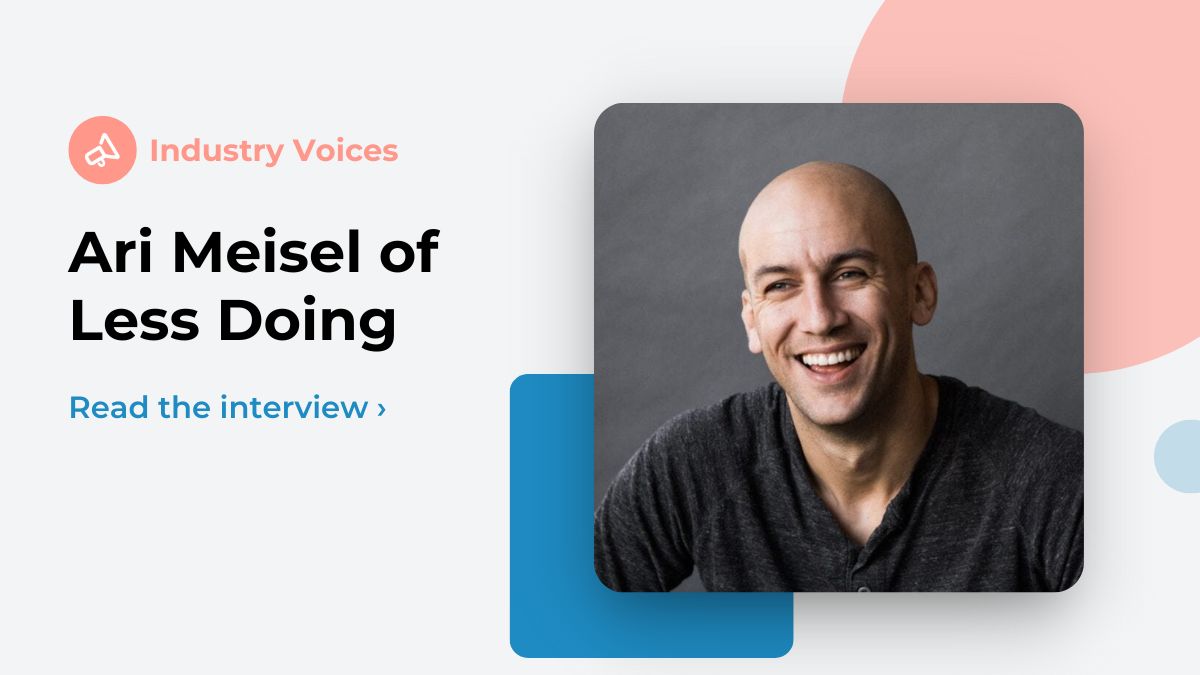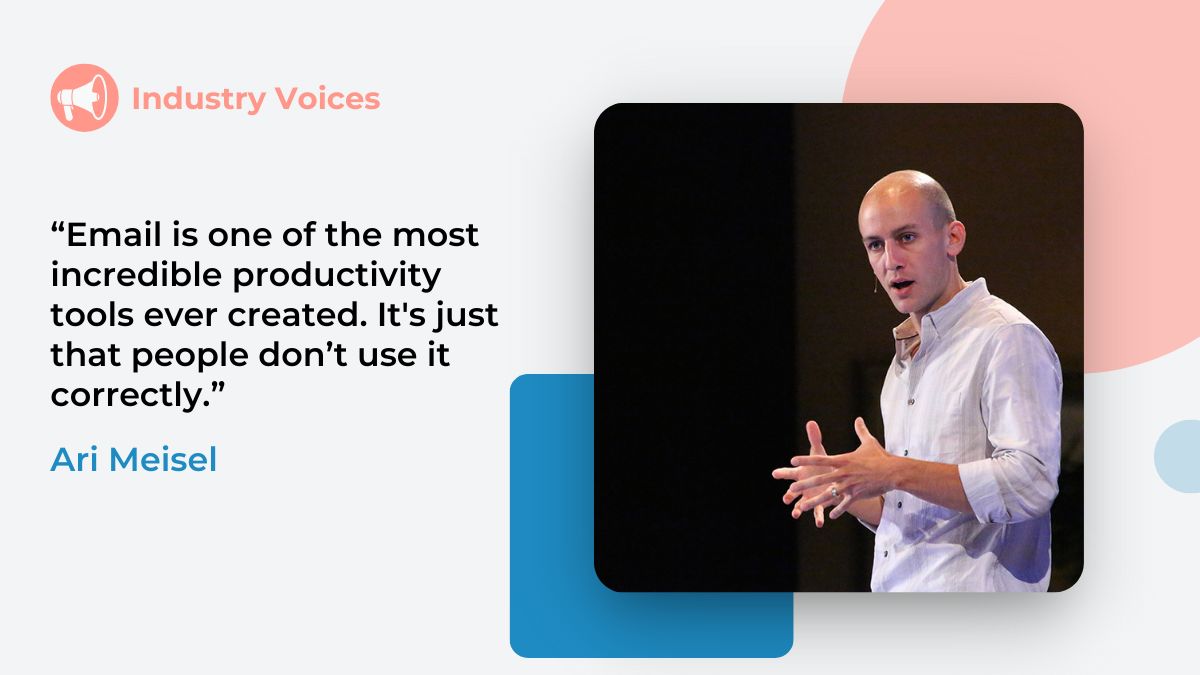
Ari Meisel, on Email Productivity and Reimagining Inbox Zero
Entrepreneur and keynote speaker Ari Meisel talks to ZeroBounce about email productivity and reinterprets the notion of Inbox Zero.
At its best email makes your life easier, but all too often it’s blamed for being a time-drain. As an “overwhelmologist,” Ari Meisel believes your email can be a productivity tool and even a source of enjoyment. It’s all about finding a system that works for you.
How to achieve better email productivity – with Ari Meisel
Ari Meisel is an entrepreneur, TED Speaker, coach and author of acclaimed books like The Art of Less Doing among others. He has some great perspectives that can help you upgrade the way you think about email – but everything else, too.
Take a closer look and see what ideas can make things better for you.
Tell us a bit about yourself, Ari. Our readers are excited to meet you.
I was born in New York City. My father’s been an art dealer for about 60 years, and my mother was an artist and a real estate broker for a really long time. Both are very entrepreneurial, and I kind of grew up in the art world and around entrepreneurship. I started my first company when I was 12, which was website design. And then started a couple more before I graduated high school.
I went to the University of Pennsylvania, to the Wharton School of Business for my undergrad, and graduated a year early – not because I was super smart, but because I wanted to get back to work. I had two majors in two minors. I majored in real estate and entrepreneurship, and I minored in art history and psychology. And when I got out, it was 2003.
Ninety-nine percent of my classmates went into finance. I went into carpentry and masonry, and went to visit a friend in upstate New York in a place called Binghamton. He showed me these buildings from the 1860s and I got this vision. I was 20 years old, and I thought I could build lofts here. So I made an offer to buy the buildings since they were very cheap.
I got a big line of credit from a local bank, because it was a big economic development project. Then I basically made a rule that if you worked on this job, you had to teach me your trade. So I spent the next three years learning and doing every construction trade there is. I learned how to run a team. I had 60 people working for me, so I dealt with politics, legal aspects, marketing. I was in the news all the time, so I had this crash course in media training. And it’s the hardest work I’ve ever done in my life, so it was extremely formative.
But when I was 23, I was working 18 hours a day, every day smoking a pack of cigarettes on the job site, and eating fast food two or three times a day. I got sick and was diagnosed with Crohn’s Disease. Crohn’s is an incurable disease. But I did overcome it. I did achieve what I believe is cured. Later I did a TEDx talk on that. A big part of healing was certainly nutrition and supplementation and things like that. But overcoming stress was the biggest thing.
To do that, I created a new system of productivity, which I call “Less Doing.” Its goal is to deal with the question: “what would you do if you only had an hour a day”? So that turned into books, speaking, consulting, coaching all over the world. Now I primarily do business coaching.
You’ve done several podcasts all about email. Are there any misconceptions people have about email?
There’s two main myths, or misconceptions. One is that it is a doorway for the entire world to walk through and say “hello” whenever they want. The other is that it is not an asynchronous tool. But email is an asynchronous communication tool. It is, by its very definition. And if you don’t treat it that way – meaning it’s just open all the time – then it’s really not. It’s just something that can grab your attention.
Furthermore, it is your tool for communicating with your world the way you want. Email is one of the most incredible productivity tools ever created. It’s just that people don’t use it correctly. And they also use it for too many kinds of communication. So those are two really important shifts that have to take place.
It’s your tool, and it’s to be used when you want.

Many of our readers use email marketing for business. The word “overwhelming” could apply to how many emails people get. What approach can email marketers make to stand out in the inbox?
I think it’s getting harder and harder to stand out when it comes to email marketing, but I think personalization is the best thing. There are some really bad ones out there.
Someone almost caught me the other day. They sent me an email and they said it was a personal invitation. There was something that looked like a video, and the video preview was the guy’s little face, and a screen scrolling of my website. I thought, “all right. I’ll take a look.”
Related: 5 examples of irresistible email subject lines for event invitations
I looked at it and it was a static image of the guy. So it wasn’t a video, and it was a generic voiceover of him saying: “We can help people just like you.” Then clearly someone just auto-scrolling my website. That has the opposite effect of the goal.
What about personal emails? How can someone get more out of their communications?
The biggest thing to understand about personal email is that email is a transactional communication tool, right? If you think about the way that most emails are, it’s like, hey, I’m so and so, do you have the thing? And the person responds, yes, we have the thing. Do you want to buy it? Yes, I do. How much? It’s very much like ping pong, very back and forth, very transactional. So if you’re communicating with somebody in a transactional way, then it works great.
You know, that’s why businesses can use email effectively with outsiders. I don’t think email should ever be used as an internal communication tool. It’s a transactional tool. So if you want to have transactional conversations with people in your life, which maybe you do, that’s fine.
But when you want to have conversations, then you need to switch. You actually need to switch to other platforms, such as the one I’m talking to you on now, which is Voxer or Slack. Or maybe it’s text messaging, whatever it is, you have to be intentional about the platform that you use for the types of communication you want. You’re going to start to see a theme, and as I answer your questions here, we need to use email less.
That’s part of the problem.
So it’s not necessarily about how we make email better. How do we do this? We have to go higher up the chain and reduce the amount of email we use to begin with.
To inbox zero, or to not inbox zero?
Inbox zero – it’s got to be. And not just inbox zero. Notification zero. Because here’s the thing: inbox zero, first of all, doesn’t mean that you actually have zero things in your inbox. That’s like a whack-a-mole type of situation.
If you have something in your inbox, you know what the plan is. I teach a 3-D decision matrix for email, which is you either deal with it, defer it, or delete it. As long as you have a clear plan of how to deal with the emails in your inbox, at your choice of time, then that’s effectively inbox zero.

What advice would you give to someone who feels frustrated with email?
The biggest issue I have with people complaining about email is that they either never learn how to use it correctly or they’re just over-using it. They’re a big part of the problem.
There’s a boomerang effect to email. The more email we send, the more email we get. So they’re almost always part of the problem. Not to mention that my usual response is: “hey, if email is that bad and you hate it so much, don’t have email. Make the responsible adult decision and say: I’m not gonna do email.”
Some people look at that and think: “how could you possibly in this world not have email?” There are some very, very successful billionaires even who have famously never used email.
There’s nothing wrong with saying, “hey, I don’t do email, but you can email my assistant or you can email my partner.” Or, “If you really need to get in touch with me directly, you can text me” or whatever the method is that you want to use. You do not have to have email if it’s that bad. I get why people complain about it and why it stresses them out. We can either do something about it or we can say “no more email.”
Some people notoriously forget to respond to emails. What advice would you give them?
When someone doesn’t respond to an email, that bothers me quite a bit. It’s not because I consider it a personal affront. I find it to be unacceptable. If you’re going to have email, then you need to have some system for responding to emails, and it doesn’t have to be you.
You can have an autoresponse. And I’ve seen this: “I really can’t do email. I’ve declared email bankruptcy,” or “I hate email,” whatever it is. “But if you really want to get in touch with me, here’s the way to do it.”
Or, “If you have an idea about this, talk to this person,” or whatever it might be. To not respond at all shows that you have poor systems in place. That’s what it says to me.

Sometimes in business emails, a gatekeeper can help facilitate a connection, but sometimes they stand in the way. Should someone hire an assistant to handle email duties?
Gatekeepers are an interesting thing. As I mentioned before, there’s nothing wrong with saying “I don’t do emails. You can email Ari’s Assistant at Gmail.” And then it’s very clear that they’re communicating with that person. They’re trying to get whatever they want to get from them, but they’re not talking to you.
I find it a little bit concerning when people have an assistant manage their email. First of all, it’s a terrible use of somebody’s mind and resources. It also breaches a level of trust. If somebody’s emailing with someone and they believe that email is being answered by somebody else who’s monitoring that email, it breaches a level of trust. It’s okay to have gatekeepers as long as it’s very clear what their role is.
Is there a habit that the people who send marketing emails should abandon?
Stop sending crap out is the biggest one. There are a lot of really good newsletters out there. I think we need to do whatever we can as a society to eliminate spammers, because it just makes everything worse for everybody else. If it looks remotely spammy, don’t send it!
If you want to stand out, be interesting!
Related: Why emails go to spam – and how to fix it
What are the email newsletters that you love?
There’s very few newsletters that I actually read. “Ben’s Bytes” is one, which is all about AI stuff. “NextDraft” is another one, it’s Dave Pell’s great recap of news from the day. It’s very editorialized and he does a really good job. Then, “The Manual” from Trainual, which is all about processes.
What’s coming up in the future for you?
I’ve just partnered up with an organization that’s launching called Princeton Kaizen. It’s princetonkaizen.com, which will be a leadership and business growth online academy and coaching program. I’m signed on to be the chief methodologist. I’m very excited about that.
Quick Question, Quick Answer with Ari Meisel
What website do you go to the most?
Right now the website I go to the most is ChatGPT.
What is your favorite place to work?
My favorite place to work is in my workshop. I have a woodworking shop. I got really into woodworking over the pandemic. That’s where I love to be around my tools and do things.
I actually don’t have a computer. I do everything from my phone, so if I’m moving, that’s a good thing. I’m standing in my workshop, I’m walking the dogs. My work is pretty much what I’m doing right now. It’s me talking. Anywhere I can move, I’m going to work.
How often do you check your email?
This is a great question, because I love it when people say “I only check my emails twice a day.” They’re full of it when they say that. It’s just totally not true. There’s this person I really respect who does productivity work and I’ve done collaborations with them. She has an autoresponder that says “Email is really not efficient for me. I only check my email once a day and I’ll respond to you once a week.”
The last time I got that autoresponder from her, she responded to me 20 minutes later. It’s BS then, so what’s the point?
I check my emails probably 60 times a day. That’s the answer! There’s always interesting things in my email the way that it’s set up.
It’s not a whole bunch of wasted time and there’s nothing wrong with checking it multiple times a day if you know what you’re going to do. I can check my email while I’m going to the bathroom. Walking to the bathroom, I can probably go through ten emails as quickly as some other people could go through one.
If you could meet any person in the world, who would it be? What would you ask them?
That’s a really tough one because I have to say, I have been extremely fortunate in my life to meet some of the greatest entrepreneurs and business leaders in the world. I’ve worked with Tony Robbins and Daymond John and Joe Polish, Jay Abraham, you name it. I’ve just been very, very fortunate.
So there’s no one necessarily on my list, although I think it would probably be pretty interesting to meet Elon Musk and have a conversation with him.
What habit do you see in people who succeed?
For me the definition of success is being better today, in any way, than I was yesterday. That to me is the true embodiment of “kaizen”: constant incremental improvements, change for the good. The best thing I can offer.
Want to connect with Ari? Follow him on LinkedIn, Twitter – and check out his platform, lessdoing.com
Table of Contents
- How to achieve better email productivity – with Ari Meisel
- Tell us a bit about yourself, Ari. Our readers are excited to meet you.
- You’ve done several podcasts all about email. Are there any misconceptions people have about email?
- Many of our readers use email marketing for business. The word “overwhelming” could apply to how many emails people get. What approach can email marketers make to stand out in the inbox?
- What about personal emails? How can someone get more out of their communications?
- To inbox zero, or to not inbox zero?
- What advice would you give to someone who feels frustrated with email?
- Some people notoriously forget to respond to emails. What advice would you give them?
- Sometimes in business emails, a gatekeeper can help facilitate a connection, but sometimes they stand in the way. Should someone hire an assistant to handle email duties?
- Is there a habit that the people who send marketing emails should abandon?
- What are the email newsletters that you love?
- What’s coming up in the future for you?
- Quick Question, Quick Answer with Ari Meisel
- What website do you go to the most?
- What is your favorite place to work?
- How often do you check your email?
- If you could meet any person in the world, who would it be? What would you ask them?
- What habit do you see in people who succeed?






